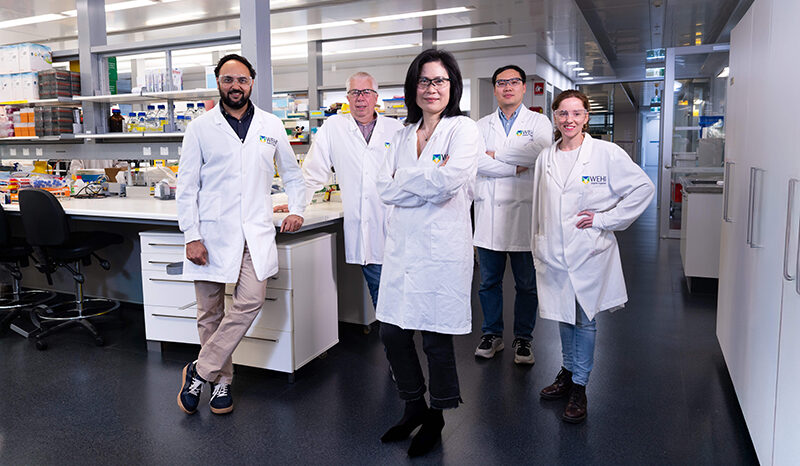Ng AP, Nutt SL. Flicking the switch for B-cell development. Genes & Development. 2026;40(3-4):10.1101/gad.353397.125
Ashayeripanah M, Coughlan H, Zhang S, Yan J, Bandala-Sanchez E, Jenika D, Lin D, Tullett KM, Naik SH, Groom JR, Lahoud MH, Belz GT, Huntington ND, Smyth GK, Nutt SL, Chopin M. Interleukin 4 selectively expands functional type 1 conventional dendritic cells from bone marrow progenitors. Cell Reports. 2026;45(1):10.1016/j.celrep.2025.116772
Wang Y, Liu X, Bond AC, Oh S, Ochiai S, Larson AR, Qualls AE, Sun IH, Chopin M, Gardner JM, Nutt SL, Ronchese F, Pellicci DG, Chong MMW. Unexpected heterogeneity and tissue-specific properties of the thymic hematopoietic antigen–presenting cell network. Proceedings of the National Academy of Sciences of the United States of America. 2025;122(41):10.1073/pnas.2508184122
Dalit L, Tan CW, Sheikh AA, Munnings R, Howson LJ, Alvarado C, Hussain T, Zaini A, Cooper L, Kirn A, Hailes L, Nguyen A, Williams BE, Zheng MZM, van de Sandt CE, Mackay LK, Flanagan KL, Kedzierska K, Harris N, Juno JA, Zaph C, La Gruta NL, Davis MJ, Nutt SL, Good-Jacobson KL, Bryant VL, Groom JR. Divergent cytokine and transcriptional signatures control functional T follicular helper cell heterogeneity. Nature Immunology. 2025;26(10):10.1038/s41590-025-02258-9
Xiong L, Diwakarla S, Chatzis R, Artaiz O, Macowan M, Zhang S, Garnham A, Morgan PK, Mellett NA, Meikle PJ, Lancaster GI, Marsland BJ, Nutt SL, Seillet C. Acute exposure to high-fat diet impairs ILC3 functions and gut homeostasis. Immunity. 2025;58(5):10.1016/j.immuni.2025.03.017
Broomfield BJ, Tan CW, Qin RZ, Abberger H, Duckworth BC, Alvarado C, Dalit L, Lee CL, Mugan RS, Mazrad ZAI, Muramatsu H, Mackiewicz L, Williams BE, Chen J, Takanashi A, Fabb S, Pellegrini M, Rogers KL, Moon WJ, Pouton CW, Davis MJ, Nutt SL, Pardi N, Wimmer VC, Groom JR. Transient inhibition of type I interferon enhances CD8+ T cell stemness and vaccine protection. Journal of Experimental Medicine. 2025;222(5):10.1084/jem.20241148
Nie J, Tellier J, Tarasova I, Nutt SL, Smyth GK. T2T-CHM13 versus hg38: accurate identification of immunoglobulin isotypes from scRNA-seq requires a genome reference matched for ancestry. NAR Genomics and Bioinformatics. 2025;7(2):10.1093/nargab/lqaf074
Nie J, Ng AP, Nutt SL. Post-translational control of B lineage commitment. Nature Immunology. 2024;25(12):10.1038/s41590-024-02019-0
Ding Z, Hagan M, Yan F, Schroer NWY, Polmear J, Good-Jacobson KL, Dvorscek AR, Pitt C, O’Donnell K, Nutt SL, Zotos D, McKenzie C, Hill DL, Robinson MJ, Quast I, Koentgen F, Tarlinton DM. Ki67 deficiency impedes chromatin accessibility and BCR gene rearrangement. Journal of Experimental Medicine. 2024;221(8):10.1084/jem.20232160
Saito Y, Harada A, Ushijima M, Tanaka K, Higuchi R, Baba A, Murakami D, Nutt SL, Nakagawa T, Ohkawa Y, Baba Y. Plasma cell differentiation is regulated by the expression of histone variant H3.3. Nature Communications. 2024;15(1):10.1038/s41467-024-49375-x






